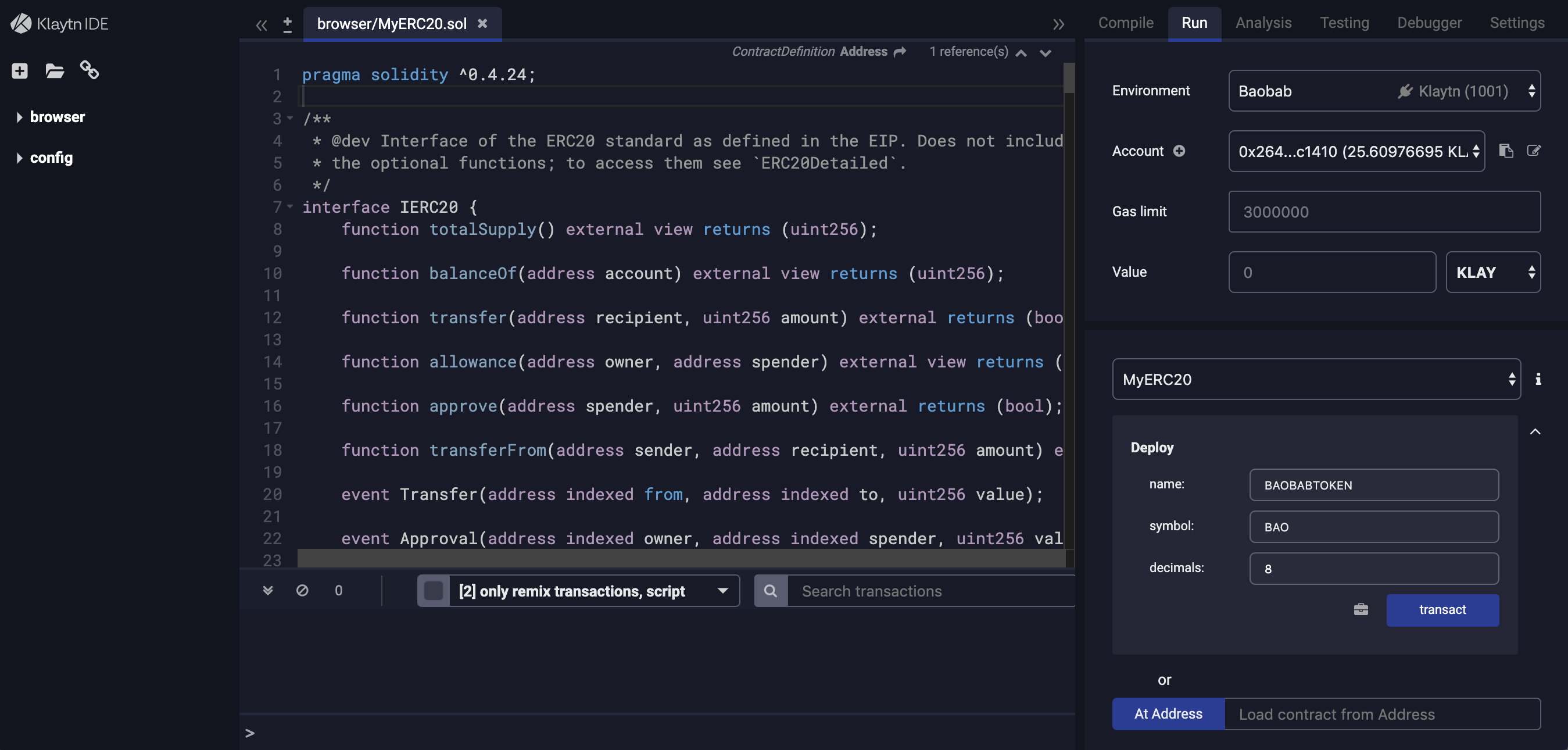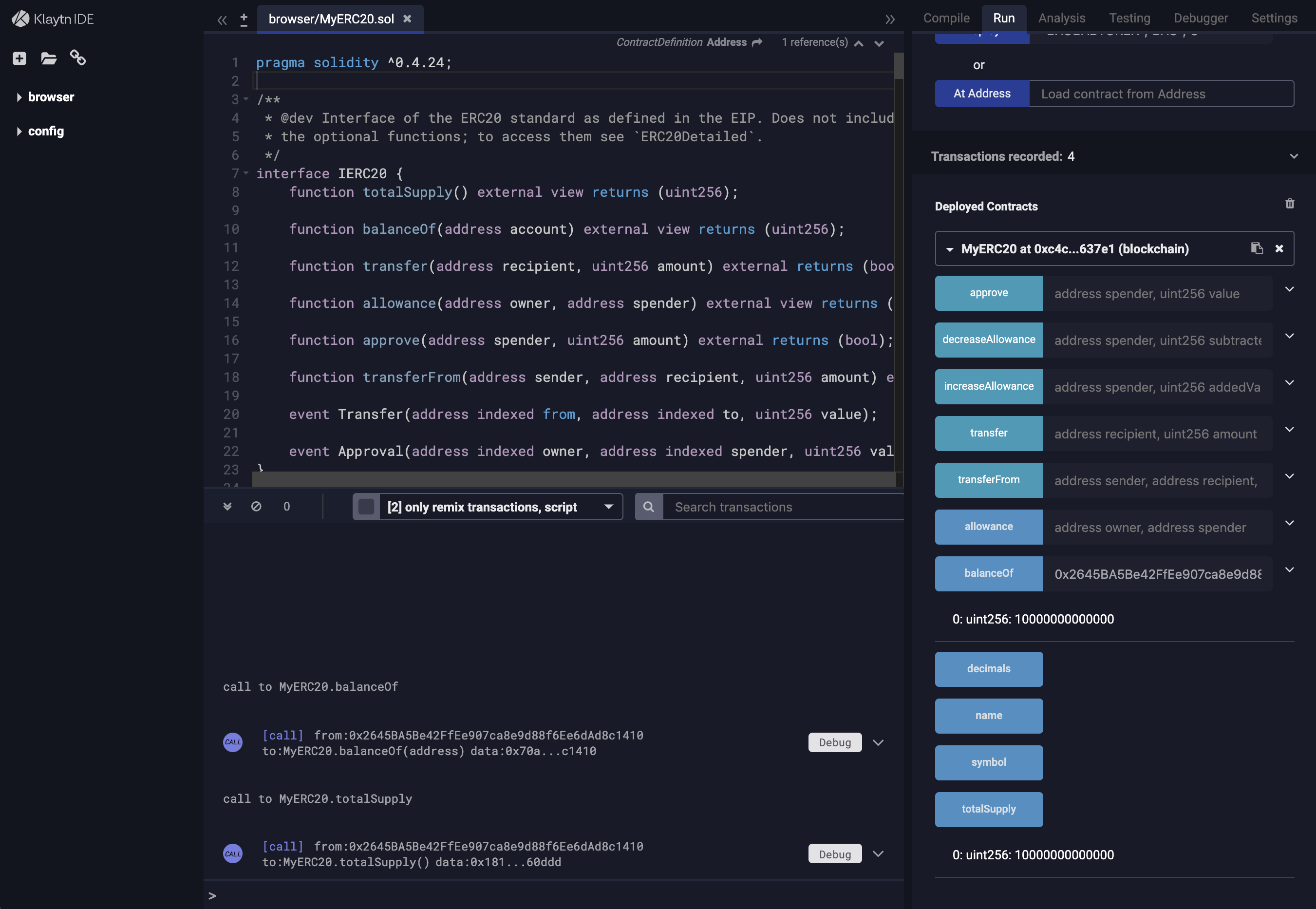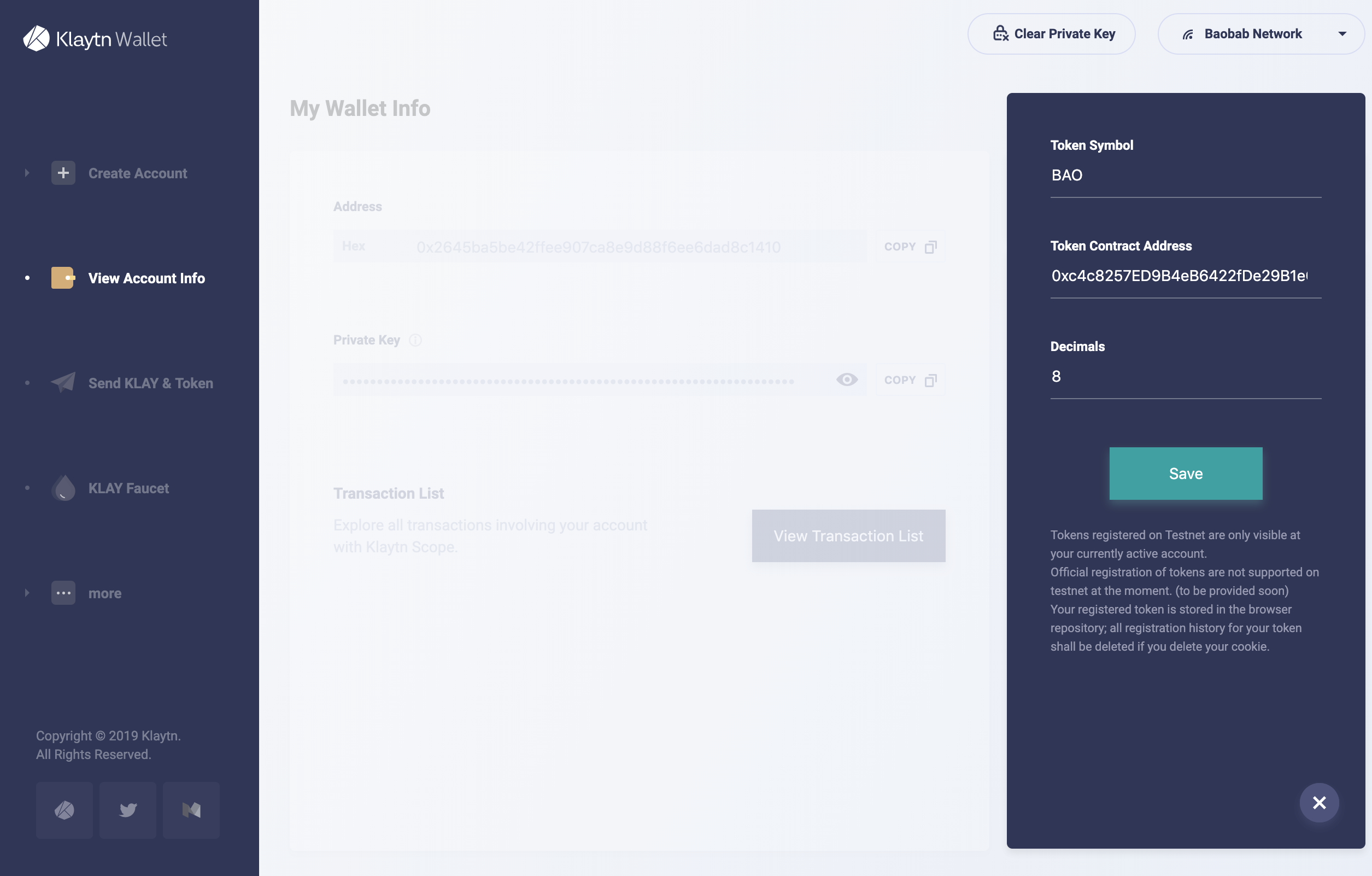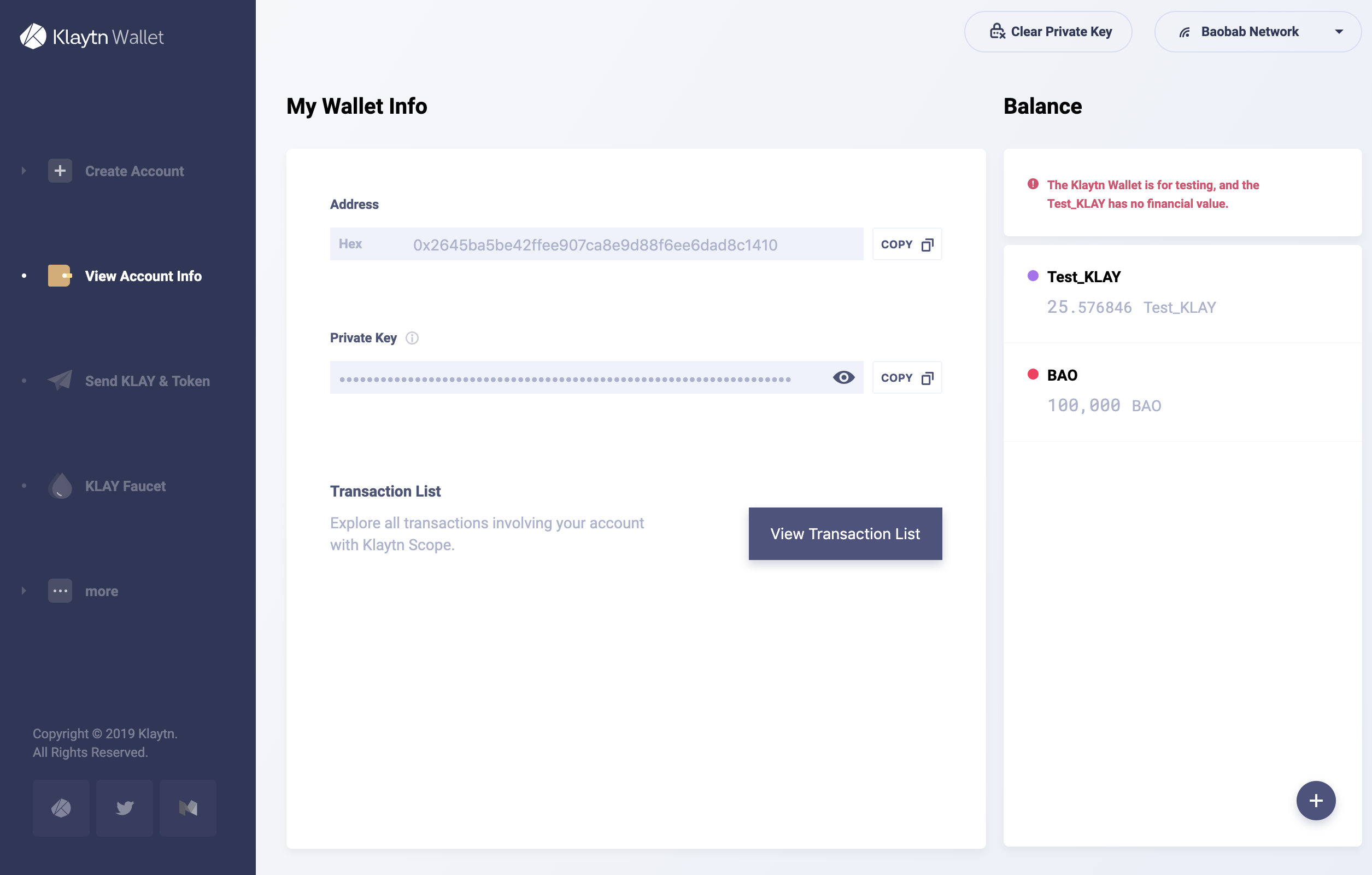ERC-20
소개
이 튜토리얼은 Klaytn 토큰 표준, 특히 대체 가능한 토큰 표준 (ERC-20)을 준수하는 ERC-20 호환 토큰 예제를 만들 수 있도록 도와줍니다.
ERC-20 토큰 표준은 아래와 같이 두 가지 이벤트와 9가지 메서드(3가지 옵션 메서드 포함)를 정의하고 있습니다. ERC-20 호환 토큰은 다음과 같은 인터페이스를 구현하는 토큰 컨트랙트입니다.
function name() public view returns (string) //optionalfunction symbol() public view returns (string) //optionalfunction decimals() public view returns (uint8) //optionalfunction totalSupply() public view returns (uint256)function balanceOf(address _owner) public view returns (uint256 balance)function transfer(address _to, uint256 _value) public returns (bool success)function transferFrom(address _from, address _to, uint256 _value) public returns (bool success)function approve(address _spender, uint256 _value) public returns (bool success)function allowance(address _owner, address _spender) public view returns (uint256 remaining)event Transfer(address indexed _from, address indexed _to, uint256 _value)event Approval(address indexed _owner, address indexed _spender, uint256 _value)
개발자는 위 인터페이스를 기반으로 새로운 기능과 로직을 추가하여 토큰을 커스터마이징하고 Klaytn 네트워크에 배포할 수 있습니다. 자세한 내용은 공식 ERC-20 문서를 참고하시기 바랍니다.
이 튜토리얼에서는 ERC-20 호환 토큰인 MyERC20.sol을 구현하겠습니다. 이 토큰은 미리 정의된 양의 토큰을 발행하고 배포 시 모든 토큰을 컨트랙트 소유자에게 보냅니다.
MyERC20.sol은 OpenZeppelin의 ERC20 구현을 기반으로 합니다. 이 튜토리얼의 코드 대부분은 OpenZeppelin 2.3에서 포크되었으며, MyERC20.sol을 구현하기 위해 다음 Solidity 파일이 사용됩니다.
- https://github.com/OpenZeppelin/openzeppelin-solidity/blob/v2.3.0/contracts/token/ERC20/IERC20.sol
- https://github.com/OpenZeppelin/openzeppelin-solidity/blob/v2.3.0/contracts/token/ERC20/ERC20.sol
- https://github.com/OpenZeppelin/openzeppelin-solidity/blob/v2.3.0/contracts/token/ERC20/ERC20Detailed.sol
- https://github.com/OpenZeppelin/openzeppelin-solidity/blob/v2.3.0/contracts/math/SafeMath.sol
1. ERC-20 스마트 컨트랙트 작성하기
1.1 MyERC20의 전체 구조
MyERC20.sol의 전체 소스 코드는 아래와 같습니다. 이 구현에서 constructor는 컨트랙트 배포 시 미리 정의된 양의 토큰을 발행하기 위해 _mint를 호출합니다.
pragma solidity ^0.5.0;/** * @dev Interface of the ERC20 standard as defined in the EIP. Does not include * the optional functions; to access them see `ERC20Detailed`. */interface IERC20 { function totalSupply() external view returns (uint256); function balanceOf(address account) external view returns (uint256); function transfer(address recipient, uint256 amount) external returns (bool); function allowance(address owner, address spender) external view returns (uint256); function approve(address spender, uint256 amount) external returns (bool); function transferFrom(address sender, address recipient, uint256 amount) external returns (bool); event Transfer(address indexed from, address indexed to, uint256 value); event Approval(address indexed owner, address indexed spender, uint256 value);}library SafeMath { /** * @dev Returns the addition of two unsigned integers, reverting on * overflow. * * Counterpart to Solidity's `+` operator. * * Requirements: * - Addition cannot overflow. */ function add(uint256 a, uint256 b) internal pure returns (uint256) { uint256 c = a + b; require(c >= a, "SafeMath: addition overflow"); return c; } /** * @dev Returns the subtraction of two unsigned integers, reverting on * overflow (when the result is negative). * * Counterpart to Solidity's `-` operator. * * Requirements: * - Subtraction cannot overflow. */ function sub(uint256 a, uint256 b) internal pure returns (uint256) { require(b <= a, "SafeMath: subtraction overflow"); uint256 c = a - b; return c; } /** * @dev Returns the multiplication of two unsigned integers, reverting on * overflow. * * Counterpart to Solidity's `*` operator. * * Requirements: * - Multiplication cannot overflow. */ function mul(uint256 a, uint256 b) internal pure returns (uint256) { // Gas optimization: this is cheaper than requiring 'a' not being zero, but the // benefit is lost if 'b' is also tested. // See: https://github.com/OpenZeppelin/openzeppelin-solidity/pull/522 if (a == 0) { return 0; } uint256 c = a * b; require(c / a == b, "SafeMath: multiplication overflow"); return c; } /** * @dev Returns the integer division of two unsigned integers. Reverts on * division by zero. The result is rounded towards zero. * * Counterpart to Solidity's `/` operator. Note: this function uses a * `revert` opcode (which leaves remaining gas untouched) while Solidity * uses an invalid opcode to revert (consuming all remaining gas). * * Requirements: * - The divisor cannot be zero. */ function div(uint256 a, uint256 b) internal pure returns (uint256) { // Solidity only automatically asserts when dividing by 0 require(b > 0, "SafeMath: division by zero"); uint256 c = a / b; // assert(a == b * c + a % b); // There is no case in which this doesn't hold return c; } /** * @dev Returns the remainder of dividing two unsigned integers. (unsigned integer modulo), * Reverts when dividing by zero. * * Counterpart to Solidity's `%` operator. This function uses a `revert` * opcode (which leaves remaining gas untouched) while Solidity uses an * invalid opcode to revert (consuming all remaining gas). * * Requirements: * - The divisor cannot be zero. */ function mod(uint256 a, uint256 b) internal pure returns (uint256) { require(b != 0, "SafeMath: modulo by zero"); return a % b; }}/** * @dev Implementation of the `IERC20` interface. * * This implementation is agnostic to the way tokens are created. This means * that a supply mechanism has to be added in a derived contract using `_mint`. * For a generic mechanism see `ERC20Mintable`. * * *For a detailed writeup see our guide [How to implement supply * mechanisms](https://forum.zeppelin.solutions/t/how-to-implement-erc20-supply-mechanisms/226).* * * We have followed general OpenZeppelin guidelines: functions revert instead * of returning `false` on failure. This behavior is nonetheless conventional * and does not conflict with the expectations of ERC20 applications. * * Additionally, an `Approval` event is emitted on calls to `transferFrom`. * This allows applications to reconstruct the allowance for all accounts just * by listening to said events. Other implementations of the EIP may not emit * these events, as it isn't required by the specification. * * Finally, the non-standard `decreaseAllowance` and `increaseAllowance` * functions have been added to mitigate the well-known issues around setting * allowances. See `IERC20.approve`. */contract MyERC20 is IERC20 { using SafeMath for uint256; mapping (address => uint256) private _balances; mapping (address => mapping (address => uint256)) private _allowances; // NOTE Start of https://github.com/OpenZeppelin/openzeppelin-solidity/blob/v2.3.0/contracts/token/ERC20/ERC20Detailed.sol string private _name; string private _symbol; uint8 private _decimals; constructor (string memory name, string memory symbol, uint8 decimals) public { _name = name; _symbol = symbol; _decimals = decimals; _mint(msg.sender, 100000 * 10 ** uint256(decimals)); // CAUTION! } /** * @dev Returns the name of the token. */ function name() public view returns (string memory) { return _name; } /** * @dev Returns the symbol of the token, usually a shorter version of the * name. */ function symbol() public view returns (string memory) { return _symbol; } /** * @dev Returns the number of decimals used to get its user representation. * For example, if `decimals` equals `2`, a balance of `505` tokens should * be displayed to a user as `5,05` (`505 / 10 ** 2`). * * Tokens usually opt for a value of 18, imitating the relationship between * Ether and Wei. * * > Note that this information is only used for _display_ purposes: it in * no way affects any of the arithmetic of the contract, including * `IERC20.balanceOf` and `IERC20.transfer`. */ function decimals() public view returns (uint8) { return _decimals; } // NOTE End of https://github.com/OpenZeppelin/openzeppelin-solidity/blob/v2.3.0/contracts/token/ERC20/ERC20Detailed.sol uint256 private _totalSupply; /** * @dev See `IERC20.totalSupply`. */ function totalSupply() public view returns (uint256) { return _totalSupply; } /** * @dev See `IERC20.balanceOf`. */ function balanceOf(address account) public view returns (uint256) { return _balances[account]; } /** * @dev See `IERC20.transfer`. * * Requirements: * * - `recipient` cannot be the zero address. * - the caller must have a balance of at least `amount`. */ function transfer(address recipient, uint256 amount) public returns (bool) { _transfer(msg.sender, recipient, amount); return true; } /** * @dev See `IERC20.allowance`. */ function allowance(address owner, address spender) public view returns (uint256) { return _allowances[owner][spender]; } /** * @dev See `IERC20.approve`. * * Requirements: * * - `spender` cannot be the zero address. */ function approve(address spender, uint256 value) public returns (bool) { _approve(msg.sender, spender, value); return true; } /** * @dev See `IERC20.transferFrom`. * * Emits an `Approval` event indicating the updated allowance. This is not * required by the EIP. See the note at the beginning of `ERC20`; * * Requirements: * - `sender` and `recipient` cannot be the zero address. * - `sender` must have a balance of at least `value`. * - the caller must have allowance for `sender`'s tokens of at least * `amount`. */ function transferFrom(address sender, address recipient, uint256 amount) public returns (bool) { _transfer(sender, recipient, amount); _approve(sender, msg.sender, _allowances[sender][msg.sender].sub(amount)); return true; } /** * @dev Atomically increases the allowance granted to `spender` by the caller. * * This is an alternative to `approve` that can be used as a mitigation for * problems described in `IERC20.approve`. * * Emits an `Approval` event indicating the updated allowance. * * Requirements: * * - `spender` cannot be the zero address. */ function increaseAllowance(address spender, uint256 addedValue) public returns (bool) { _approve(msg.sender, spender, _allowances[msg.sender][spender].add(addedValue)); return true; } /** * @dev Atomically decreases the allowance granted to `spender` by the caller. * * This is an alternative to `approve` that can be used as a mitigation for * problems described in `IERC20.approve`. * * Emits an `Approval` event indicating the updated allowance. * * Requirements: * * - `spender` cannot be the zero address. * - `spender` must have allowance for the caller of at least * `subtractedValue`. */ function decreaseAllowance(address spender, uint256 subtractedValue) public returns (bool) { _approve(msg.sender, spender, _allowances[msg.sender][spender].sub(subtractedValue)); return true; } /** * @dev Moves tokens `amount` from `sender` to `recipient`. * * This is internal function is equivalent to `transfer`, and can be used to * e.g. implement automatic token fees, slashing mechanisms, etc. * * Emits a `Transfer` event. * * Requirements: * * - `sender` cannot be the zero address. * - `recipient` cannot be the zero address. * - `sender` must have a balance of at least `amount`. */ function _transfer(address sender, address recipient, uint256 amount) internal { require(sender != address(0), "ERC20: transfer from the zero address"); require(recipient != address(0), "ERC20: transfer to the zero address"); _balances[sender] = _balances[sender].sub(amount); _balances[recipient] = _balances[recipient].add(amount); emit Transfer(sender, recipient, amount); } /** @dev Creates `amount` tokens and assigns them to `account`, increasing * the total supply. * * Emits a `Transfer` event with `from` set to the zero address. * * Requirements * * - `to` cannot be the zero address. */ function _mint(address account, uint256 amount) internal { require(account != address(0), "ERC20: mint to the zero address"); _totalSupply = _totalSupply.add(amount); _balances[account] = _balances[account].add(amount); emit Transfer(address(0), account, amount); } /** * @dev Destroys `amount` tokens from `account`, reducing the * total supply. * * Emits a `Transfer` event with `to` set to the zero address. * * Requirements * * - `account` cannot be the zero address. * - `account` must have at least `amount` tokens. */ function _burn(address account, uint256 value) internal { require(account != address(0), "ERC20: burn from the zero address"); _balances[account] = _balances[account].sub(value); _totalSupply = _totalSupply.sub(value); emit Transfer(account, address(0), value); } /** * @dev Sets `amount` as the allowance of `spender` over the `owner`s tokens. * * This is internal function is equivalent to `approve`, and can be used to * e.g. set automatic allowances for certain subsystems, etc. * * Emits an `Approval` event. * * Requirements: * * - `owner` cannot be the zero address. * - `spender` cannot be the zero address. */ function _approve(address owner, address spender, uint256 value) internal { require(owner != address(0), "ERC20: approve from the zero address"); require(spender != address(0), "ERC20: approve to the zero address"); _allowances[owner][spender] = value; emit Approval(owner, spender, value); } /** * @dev Destoys `amount` tokens from `account`.`amount` is then deducted * from the caller's allowance. * * See `_burn` and `_approve`. */ function _burnFrom(address account, uint256 amount) internal { _burn(account, amount); _approve(account, msg.sender, _allowances[account][msg.sender].sub(amount)); }}
MyERC20.sol은 하나의 인터페이스 IERC20, 하나의 라이브러리 SafeMath, 그리고 IERC20 인터페이스를 구현하는 하나의 컨트랙트 MyERC20으로 구성되어 있습니다.
IERC20인터페이스는 ERC-20 규격에서 설명하는 필수 인터페이스를 정의합니다.SafeMath라이브러리는 Solidity의 산술 연산에 대한 래퍼를 정의하며,uint256타입의 Solidity를 안전하게 계산하기 위해 오버플로우 검사를 추가했습니다.MyERC20은IERC20인터페이스를 구현하며, ERC-20 사양에 설명된 세 가지 선택적 메서드도 정의합니다.- ERC20 외에도
constructor가 정의되어 있으며, 이 생성자는 새로운 ERC20 토큰 이름과 심볼을 정의하고 미리 정의된 양의 토큰을 발행하는 데 사용됩니다.constructor는 처음 배포할 때 한 번 호출됩니다.
- ERC20 외에도
1.2 중요한 방법 살펴보기
몇 가지 중요한 방법을 자세히 살펴보겠습니다.
(1) function balanceOf(address account) external view returns (uint256);
balanceOf는 ERC-20의 필수 메서드입니다. balanceOf`는 주어진 주소의 잔액을 반환합니다.
function balanceOf(address account) public view returns (uint256) { return _balances[account]; }
balanceOf는 _balances에 저장된 account 키의 값을 �아래와 같이 mapping (address => uint256) 유형으로 반환합니다.
mapping (address => uint256) private _balances;
balances에 사용 가능한 키 account가 없으면 0을 반환합니다.
(2) function transfer(address recipient, uint256 amount) external returns (bool);
transfer은 ERC-20의 필수 메서드입니다. transfer은 recipient에게 amount의 토큰을 전송하며, 반드시 Transfer 이벤트를 발생시켜야 합니다. 메시지 발신자의 계정 잔액에 사용할 토큰이 충분하지 않은 경우 이 함수가 발생해야 합니다.
transfer는 아래와 같이 실제 전송 및 이벤트를 구현하는 내부 메서드 _transfer를 호출하기만 하면 됩니다.
function transfer(address recipient, uint256 amount) public returns (bool) { _transfer(msg.sender, recipient, amount); return true; }
transfer은 ERC-20의 transfer 메서드의 실제 동작을 구현합니다.
또한 아래와 같이 require를 사용하여 0 주소로 토큰을 보내거나 보내는 것을 방지합니다.
function _transfer(address sender, address recipient, uint256 amount) internal { require(sender != address(0), "ERC20: transfer from the zero address"); require(recipient != address(0), "ERC20: transfer to the zero address"); _balances[sender] = _balances[sender].sub(amount); _balances[recipient] = _balances[recipient].add(amount); emit Transfer(sender, recipient, amount); }
(3) function approve(address spender, uint256 amount) external returns (bool);
approve은 ERC-20의 필수 방식입니다. approve을 사용하면 spender가 amount까지 계정에서 여러 번 인출할 수 있습니다. 이 함수가 여러 번 호출되면 단순히 허용량을 amount으로 재설정합니다.
approve은 approve의 실제 동작을 구현하는 내부 메서드 _approve를 호출할 뿐입니다. msg.sender는 계정 owner로서 전달됩니다.
function approve(address spender, uint256 value) public returns (bool) { _approve(msg.sender, spender, value); return true; } function _approve(address owner, address spender, uint256 value) internal { require(owner != address(0), "ERC20: approve from the zero address"); require(spender != address(0), "ERC20: approve to the zero address"); _allowances[owner][spender] = value; emit Approval(owner, spender, value); }
_approve은 특정 address에서 spender에 대해 허용된 value를 유지하는 2차원 사전인 _allowances을 업데이트합니다.
mapping (address => mapping (address => uint256)) private _allowances;
(4) function _mint(address account, uint256 amount) internal
_mint는 ERC-20의 일부가 아닙니다. 하지만 새로운 ERC-20 토큰을 생성하는 방법이 필요했고, 이번 구현에서는 아래와 같이 새로운 토큰을 생성하기 위해 _mint를 도입했습니다.
function _mint(address account, uint256 amount) internal { require(account != address(0), "ERC20: mint to the zero address"); _totalSupply = _totalSupply.add(amount); _balances[account] = _balances[account].add(amount); emit Transfer(address(0), account, amount); }
_mint는 내부 메서드이며 이 컨트랙트 내부에서 호출할 수 있습니다.
MyERC20.sol에서 _mint는 스마트 컨트랙트를 배포할 때 constructor에서 한 번만 호출하여 미리 정의된 양의 토큰을 발행합니다.
스마트 컨트랙트를 배포한 후 토큰을 추가로 발행하려면 mint와 같은 새로운 공개 방식을 도입해야 합니다. 이 방법은 권한이 있는 사용자만 토큰을 발행할 수 있어야 하므로 주의해서 구현해야 합니다.
자세한 내용은 OpenZeppelin 예제 ERC20Mintable.sol을 참고하세요.
2. 스마트 컨트랙트 배포
Remix 온라인 IDE를 사용하거나 Truffle을 사용하여 MyERC20 스마트 컨트랙트를 배포할 수 있습니다.
2.1 Remix Online IDE를 사용하여 스마트 컨트랙트 배포하기
- Remix용 클레이튼 플러그인을 방문하여
MyERC20컨트랙트를 생성하세요. 전체 소스코드는 ERC-20 스마트 컨트랙트 작성하기에서 확인하실 수 있습니다. - 컨트랙트 배포에 사용할 계정을 준비합니다.
- 아직 계정이 없다면 https://baobab.wallet.klaytn.foundation/create 또는 https://toolkit.klaytn.foundation/account/accountKeyLegacy에서 계정을 생성합니다.
- https://baobab.wallet.klaytn.foundation/faucet에서 테스트 KLAY를 받습니다.
- 배포 파라미터를
BAOBABTOKEN,BAO,8로 설정하여MyERC20.sol을 배포해 봅시다.

배포 후, 컨트랙트를 배포할 때 사용한 계정으로 balanceOf를 호�출할 수 있습니다. 아래와 같이 계정에서 10000000000000 토큰을 사용할 수 있습니다. 위 컨트랙트를 배포할 때 decimal을 8로 설정했기 때문에 생성자에서 고정된 수의 100000 토큰을 발행했으며, 한 토큰의 소수점 값은 10^8입니다. totalSupply 메서드는 발행된 토큰의 총 공급량을 반환하며, 이 역시 10000000000000이어야 합니다.

이제 MyERC20이 출시되었습니다!
3. 클레이튼 지갑에서 ERC-20 토큰과 상호작용하기
Baobab 클레이튼 지갑을 통해 잔액을 조회하고 방금 배포한 ERC-20 호환 BAOBABTOKEN을 전송할 수 있습니다.
아래와 같이 배포된 MyERC20 컨트랙트의 주소로 지갑에 ERC-20 호환 토큰을 추가할 수 있습니다.

지갑 앱에서 ERC-20 토큰을 추가하면 아래와 같이 KLAY의 잔액과 함께 BAOBABTOKEN의 잔액이 표시됩니다. 계정에 100000 BAO 토큰이 있는 것을 ��확인할 수 있습니다.
